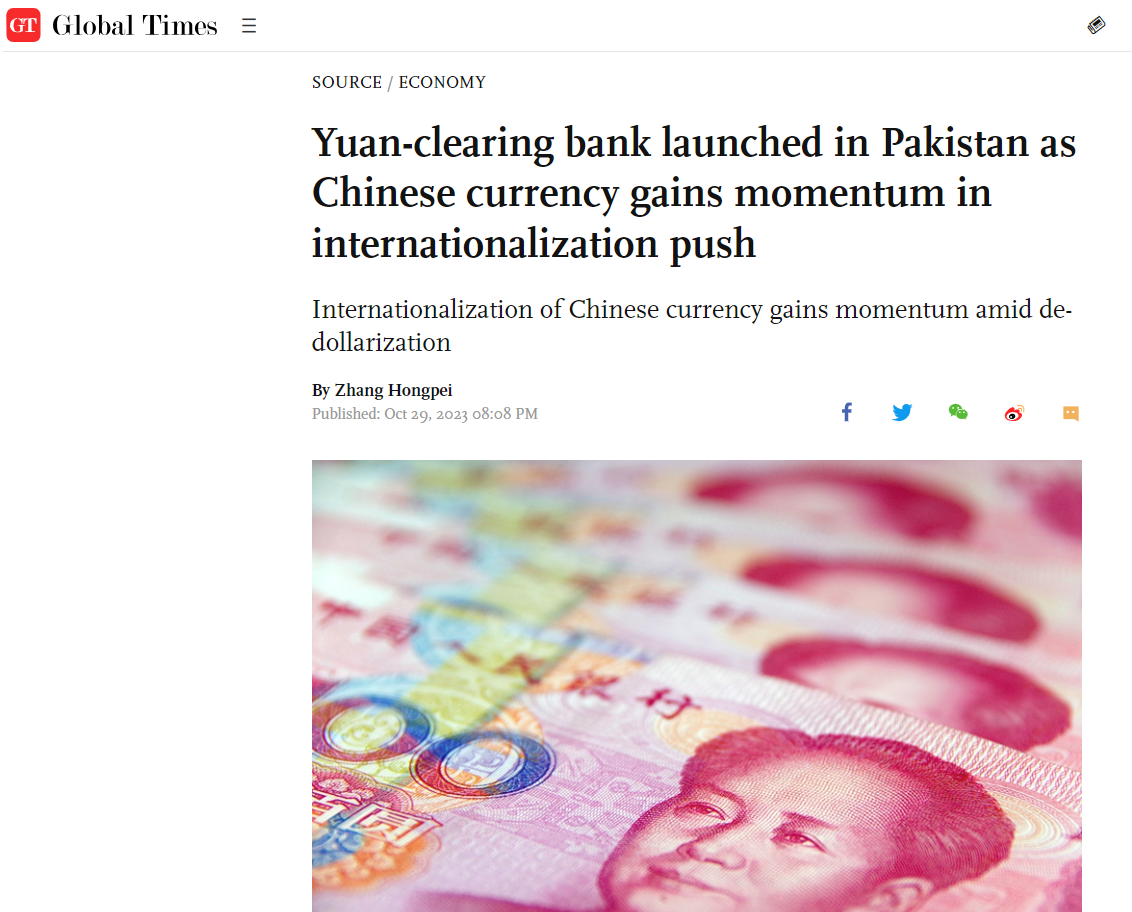LATEST INSIGHTS
Your Present Location: LATEST INSIGHTSLiu Ying: Yuan-clearing bank launched in Pakistan as Chinese currency gains momentum in internationalization push
Source: GT Published: 2023-10-29

State-run Industrial and Commercial Bank of China (ICBC) has opened a yuan-clearing bank in Pakistan, the latest example of how the Chinese currency is gaining momentum in its internationalization course amid a global push toward de-dollarization.
There is still huge potential for the yuan to be used in transactions and settlements in offshore markets based on China's economic competence and its enormous trade and business cooperation with partners, in particular the Belt and Road Initiative (BRI) participating countries and regions, experts said.
A grand opening ceremony of the yuan-clearing bank, which aims to facilitate both Pakistani and Chinese businesses and financial institutions to settle cross-border transactions and meet the financing needs of the two countries, was held in Islamabad, the capital of Pakistan on Friday, according to the Xinhua News Agency.
Under this facility, ICBC will offer services related to clearing and settlement of yuan transactions and facilitate yuan buying, selling, borrowing or lending for participating banks in Pakistan.
Highlighting China-Pakistan strategic cooperation, Chinese Ambassador to Pakistan Jiang Zaidong said that the opening of the yuan-clearing bank in Pakistan will provide financial support for the two countries' cooperation on the joint building of the BRI.
China is ready to work with Pakistan to implement the important consensus reached by the leaders of the two countries, build an upgraded version of the China-Pakistan Economic Corridor (CPEC) and make positive contributions to the high-quality construction of the BRI, the ambassador said.
Separately, a yuan-clearing bank opened in Laos last week, aimed at helping enterprises and financial institutions carry out Chinese currency transactions between China and Laos, reducing the cost of the exchange rate, facilitating trade and investment between the two countries, and maintaining financial stability in Laos and strengthening economic and commercial relations.
The Chinese central bank has so far authorized 31 yuan-clearing banks in 29 countries and regions, achieving multi-faceted coverage on all continents, official data showed.
The expanding yuan-clearing arrangements in more countries show that the currency's vitality is gaining traction in offshore markets, which has helped push ahead its internationalization course, Liu Ying, a research fellow at the Chongyang Institute for Financial Studies, Renmin University of China, told the Global Times on Sunday.
In 2022, the yuan's internationalization made steady progress, with fresh developments and transformations, the People's Bank of China said in its 2023 Yuan Internationalization Report, which was released on Friday.
Since the start of 2022, new yuan-clearing banks have been established in Laos, Kazakhstan, Pakistan and Brazil, and the overseas yuan-clearing network continues to be optimized. By the end of 2022, the balance of yuan deposits in major offshore markets reached approximately 1.5 trillion yuan ($205 billion), returning to record highs, according to the report.
A 2022 survey by the Bank for International Settlements showed that the share of yuan-denominated foreign exchange transactions in the global market has increased from 4.3 percent to 7 percent in the past three years, and its ranking has risen from the eighth spot to the fifth.
"The gains for the yuan are inseparable from China's economic competence, as the world's second-largest economy offers great certainty and confidence amid global uncertainty and complex environment," Zhou Maohua, an economist at Everbright Bank, told the Global Times.
So far this year, a growing number of countries have sought to trade in non-dollar currencies and diversify their foreign exchange reserves in a bid to counter US hegemony. Moves included Argentina's first-ever use of the yuan to repay its foreign debts and Pakistan's inaugural payment of Russian crude oil expenses in yuan.
More de-dollarization moves are expected as a result of irresponsible US policies, including monetary and fiscal splurges in previous years, according to Liu.
While recognizing the achievements made in the yuan's internationalization, experts said that more efforts are needed.
Taking the yuan-clearing bank as an example, Liu said that compared with numerous international financial centers, yuan-clearing arrangements are still insufficient. In particular, in BRI-related areas, only 17 countries and regions have established yuan-clearing banks, which obviously doesn't match with the increasing demand for offshore yuan and related business.
In the past decade, China has signed cooperation agreements with more than 150 countries and 30-plus international organizations. From 2013 to 2022, China's trade with BRI participating countries reached $19.1 trillion, with an average annual growth rate of 6.4 percent, according to the white paper on the BRI issued earlier this month.
"We need to continue promoting the layout of the yuan offshore market, adopting effective tools to stimulate overseas demand for the currency, and striving to optimize the yuan-clearing mechanism," Liu said.
Key Words: Liu Ying, Pakistan, Chinese Currency























































































 京公网安备 11010802037854号
京公网安备 11010802037854号





